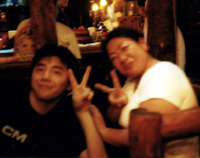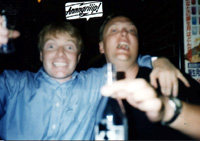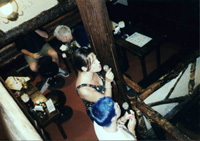
Photo. Two nice Japanese who really loved Karaoke and Sake. © Travel Explorations.
Japan is the birthplace of karaoke. It`s Japan's most beloved pastimes, and we surely want to join in on the fun. We both love to sing, but have terrible voices. Then this Karaoke bar must the perfect place for us.
We were very hardly determined to rock the ship, and hoped that the big wooden beams there would stand the high waves we caused. The graffiti on the beams created a special atmosphere, but it was far more than that.
Yakitori snack, draft beers, sakè and karaoke
All we did were to smile, nod and make a toast in their own language ("campai" - cheering), so we were brought directly in to the wild party. No mercy, the drinks had to be swallowed. From the first second when we stumbled in, we drew the locals` attention immediately. After some few Sake drinks, locals flocked around us, and wanted to join us.
Of course we had nothing against nice company, so we invited them to share our "filled up" table. Sake is a rice wine usually served cold which goes straight to your head. We raised our glass to have it filled, and never forgot to take a sip before we put it down again.
We did it in the Japanese way: always offer to serve others of your party if they have served you: ideally, one never pours one's own drinks. Our cooperation work was just perfect! After a while we forgot the earthquakes in Tokyo, and climbed down the stairs to the floors under. Finally we found the scene for the karaoke singing. It was then the show started for real, and there was no turning back.
| Photo. The singing duo Stein Morten and Geir from Norway. We were in heaven, but we didn't eat, drink, talk or sing like angels. © Travel Explorations. |
 |
We loved to beat the Japanese in their national sport. The ice was definitely broken. We were really challenged in the Japanese national sport, fortunately not Sumo wrestling, but drinking Sakè and singing karaoke. We picked up the microphones and howled like wolves to the moon. For a while I was surprised that the host didn't throw us out. It was probably the worst singing the locals ever have heard in their entire life. It is hard to believe, but we were encouraged to sing again, both solo and together.
Even the most shy guests become “genki” at karaoke. As we observed, Karaoke brought out the wild side in almost everyone, especially supported by Sake. Drinking much didn`t mean that we song better, but we thought we sounded better. As more we drank and the volume from the music rose, we made our strong efforts to expand your vocal range. It didn`t sound great. And if singing a high note doesn't feel easy - the note is too high, or more likely: our voices were very limited.
The lyrics were displayed a small screen, included colour changes synchronized with the music, to guide us in singing-along, but this didn`t help us much to singer better. Even worse than a howling wolf, we sounded like howling cats and dogs together. Songs from Elvis, ABBA and the Beatles were hard to reconize.
Between the breathtakings, we drank some more Sakè, we became more drunk and song worse. Despite this the audience cheered us on even more. And later in the evening we ended up by singing along all together. We all pretend we were great singers. As the Japanese` good old forefathers, the Samurais, the local visitors gave everything and even more.
| Photo. I am glad that someone really could sing …… The locals were very clever! © Travel Explorations. |
 |
The show went on for the whole night. I hardly noticed that the lights in the bar were turned off. It was closing time. My travel mate and I were the last visitors to leave the bar (also as our good old forth fathers, the Vikings). The sun rose, a new day begun, but for me the dark set. Totally exhausted and intoxicated I managed to find the way back to my hotel room.
The rise and fall of the karaoke singers
Sakè hangovers are definitely memorable, but I also memorised other things from the night. Surprised? OK, I had great fun, and the Japanese I joined were the absolute bravest and toughest people I ever had met. I could see that the Japanese like to see someone making a fool of themselves. It's fun to se how the Japanese` elegant formality and good manners turn them in to passionate jokers, hysterical laughers and "Kamikaze" singers.
| Photo. Visitors who had real fun - seen through my unclear eyes. © Travel Explorations. |
 |
If you don't respond on the Japanese challenges you will loose respect. So I did my singing seppuku or harakiri to avoid dishonour. Drinking Sakè and singing karaoke is a national sport for the Japanese, both concerning business and in other occasions. One good thing I will say about the Japanese is that they seem to be very tolerant when it comes to foreigners. Luckily for us!
Karaoke has its origin from Japane. Kara means empty, and oke is the abbreviation of okesutura - a Japanese reading of the word “orchestra”. The phenomenon of the "empty orchestra" started in the city of Kobe 20 years go. When a guitarist could not perform in a snack bar one night, it inspired the owner to encourage his patrons to sing along to instrumental tape recordings. Now it`s a folk sport in Japan.
A tour to Japan without visiting a Karaoke Bar will never be complete. Karaoke is one of the main social activities of Japanese adults, especially for businessmen or “salarymen”. We met some of them, and I can sure you that the forgot that they should stand up early in the morning for work next day. It`s also popular among students and other people who want to have real fun. At Karaoke bars you can "loose your face" pride if you don`t have the talent to sing, just like me and my friend.
Japanese are really nice people
I became extremely impressed by the Japanese in general. They were so polite and eager to help. Sometimes when we looked confused and didn't know where to go people showed up and wondered about that we needed help. In some occasions they followed us to the place we looked for. What an excellent service! They were also keen to talk about where you come from and what life is like there.
These people have great charm, strong and interesting culture. I will say; they have really something to be proud of. I would like to dedicate this article (report) to honour the Japanese, especially they I met at Yamagoya Bar. They were the best, bravest and some of the friendliest people I ever have met. Must you live happy rest of your life!
When returned to Norway, I "thought" I was a big hero of singing. After I sung Billy Idol`s song White Wedding in Sinantra`s Karaoke Bar in Oslo, no one clapped for me. The only resonse I got when I press me through the big audience, was from a girl. She knocked me on the should, and when I turned around, she just said to me with a big smile in her face: You song so beautiful! That girl had a great ironic sense of humour. I thanked her greatly, rushed further and finally I found a suitable place behind the audience to hide.
Stein Morten Lund, 22 July 2000
Additional information
Karaoke has become popular world wide. Actually Karaoke is a cultural export from Japan. It is derived from the word kara, which means empty, and okè, which means short for orchestra. You find Karaoke many places around in the world now, but nothing is like where in originally comes from: Japan.
Karaoke (カラオケ) is the singing of songs to music accompaniment synchronized with lyrics displayed on-screen. It originated in Japan and is now popular around the world, especially in Asia. The word “Karaoke” (カラオケ) is a combination of “kara” / 空 which means empty and “oke” / “オケ” which stands for orchestra / オーケストラ.
Read below some of the information you might need to know before entering a Karaoke place:
Going to a Karaoke in Japan
Karaoke in Japan – Survival Guide
Karaoke
How To Have a Fun Night of Karaoke in Japan
Karaoke in Japan is incredible fun! Read more about Party life on our website: Travel Explorations.














